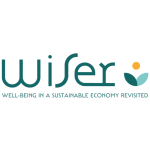WISER Project: Well-being in a Sustainable Economy Revisited

Logroño, La Rioja, Spain. 10 July 2023
The WISER Project, funded by Horizon Europe, aims to develop a new economic development framework that provides evidence-based and theoretically-sound policy insights on how to raise wellbeing of present generations (leaving no one behind) without sacrificing future well-being. This framework will allow for the identification of win-win-win-win (well-being, productivity, sustainability, and inclusiveness) development strategies, and will guide the design and implementation of policies towards the procurement of a sustainable and inclusive high well-being economy. In addition, the case studies will permit deriving important lessons from different regions of the world, Africa in particular.
The specific objectives are the following ones:
- To identify pathways of GDP growth that are well-being enhancing and environmentally and socially sustainable
- To identify ways of allocating productivity growth that contribute to sustainable well-being
- To identify other drivers of well-being and assess their relevance and relationship with economic growth
- To detect potential synergies for triggering a virtuous circle between well-being and productivity
- To expand the scope in the assessment of the consequences of inequality and exclusion
- To develop a set of indicators (a dashboard) for policy guidance and performance assessment
- To develop an evidence-based and theoretically sound model that coherently incorporates economic-growth, well-being, inclusiveness, and sustainability concern
UNIR (Universidad Internacional de La Rioja), through the Vicerrectorate for International Research and the Faculty of Business and Communication, will lead the work package that will analyze the relation between economic growth, well-being and sustainability, among other tasks in the project.
The project’s grant amounts to 3 million € (being 340,625€ for UNIR).
Coordinator: OUNL – Open Universiteit Nederland (The Netherlands)
Partners: UTWENTE – Universiteit Twente (The Netherlands), UNIR – Universidad Internacional De La Rioja (Spain), USTUTT – University of Stuttgart (Germany), UJ – University of Johannesburg (South Africa), UNIPI – Universita Di Pisa (Italy), STATEC – STATEC Research (Luxembourg), UNISI – Universita Degli Studi Di Siena (Italy), VPUU – Violence Prevention Through Urban Upgrading NPC ZA (South Africa), UICESI – Universidad ICESI (Colombia), UniBw – M Universitaet Der Bundeswehr Muenchen (Germany), DIAK – Diakonia-Ammattikorkeakoulu OY (Finland), UCM – Universidad Complutense de Madrid (Spain), UDSoE – University of Dar Es Salaam (Tanzania), USFD – The University of Sheffield (United Kingdom), FCPV – Asociacion Foro Ciudades para la Vida – (Peru), UPATRAS – Panepistimio Patron (Greece), KNUST – Kwame Nkrumah Univ. of Science & Techn. Kumasi (Ghana), CORVINUS – Budapesti Corvinus Egyetem (Hungary), ICCV – Institutul de Cercetare a Calitatii Vietii (Romania), KarU – Karatina University (Kenia), BARD – Bard College Berlin, a Liberal Arts University GGMBH (Germany), UORAN2 – Universite Mohamed Ben Ahmed Oran 2 (Algeria), APHRC – African Population & Health Research Centre Kenya (Kenia)
Web page: https://www.wiserhorizons.eu/
Reference: 101094546
Time span: 1 October 2023 – 30 September 2026
Funding type: European public

